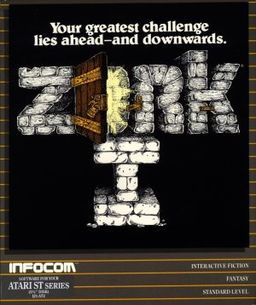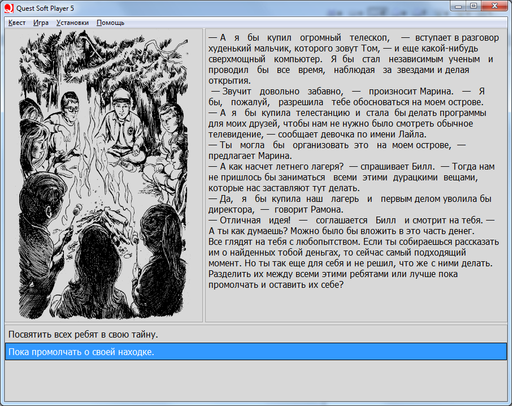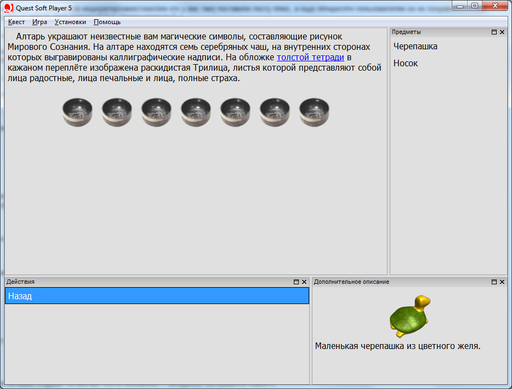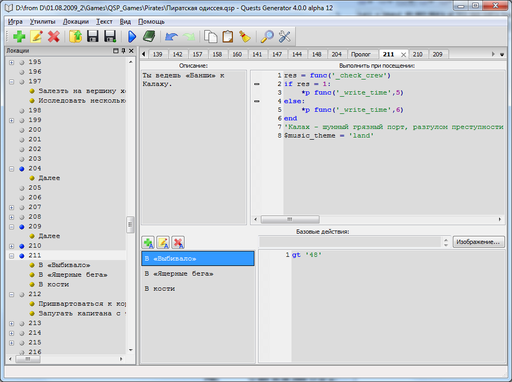Interactive Fiction or Use your imagination ...
 I am the author of the well-known in certain circles of the QSP platform designed to create text (sic!) Games.
I am the author of the well-known in certain circles of the QSP platform designed to create text (sic!) Games.Such a rare genre is poorly covered in runet, so I really want to rectify the situation and briefly talk about interactive literature and QSP in particular.
This is my first article for Habrasoobshchestva, so please do not kick much :)
Introduction
Nowadays, "popcorn" cinema and no less primitive video games, when the graphic component almost completely replaces the sample plot, rarely does anyone think about trying something else, something that will allow him to spend time with interest. Some, who have not yet forgotten what books are, return to them, and some discover the world of interactive literature, in which everyone can try himself both as the main character and as the creator of his own world. It is enough to use the imagination ...
')
So, what is "interactive literature" or, in the English version, "Interactive Fiction"? In the broadest sense of the term, it is any kind of fiction that differs by non-linear development of the plot, according to the actions of the reader (in the computer version - the user). From the interactive literature (IL) in Russia, books by Dmitry Braslavsky are known, who took the western series “Fighting Fantasy” as the basis of their books. But in this article it will be considered the computer version of interactive literature, the majority of which are the so-called text games, or “text quests”, which are widely distributed. The history of the development of text-based games began at a time when computers, without which life is now unthinkable, acquired keyboards and displays, and subsequently a mouse. Admittedly, the first computer text game was Adventure, or Adventure, written in 1976 by two computer scientists from Stanford, Will Krauter, and Don Woods. The game was only textual, controlled by the simplest text commands of the “noun verb” type and consisted of wandering through a maze of caves in search of treasures and magical artifacts. This game has played a huge role in the development of a whole genre of computer games. In the summer of 1979, the Infocom firm was founded by several students from the Massachusetts Institute of Technology, which in ten years of its history published about 30 games of this genre. It was this company that introduced the term "Interactive Fiction" and served as the basis for imitation of all subsequent developers of computer text games. At the beginning of the article, the cover of the first Infocom - Zork I game is used.
Further development of computer capabilities could not but affect the genre of interactive literature - graphics, music and a multi-window interface appear in games, but the main driving force of the genre was and remains the artistic text and, as a rule, a non-linear plot. An additional advantage of games of this genre are their low requirements for system resources and cross-platform, that is, they can be played on the most antediluvial computers, and on handhelds or cell phones.
In the process of developing computer interactive literature, it turned out that text games were divided into text-based games using the so-called “parser” and games using menu-driven control. Due to the fact that people's thinking is different, it is easier and more convenient for someone to control input using the menu system, and it is better for someone to use a parser, so these two methods quite comfortably get along with each other.
Interactive Literature in Russia
It is worth considering separately the development of IL in Russia. It so happened that text games gained popularity first in America, and then in Europe, mainly due to the fact that the text was in English. A simple English grammar greatly simplified the program's parsing of the entered phrases. But in Russia, for the Russian language, this was a difficult task, so games that control through the menu, sometimes also using a simplified parser (typing names, names, numbers) became widespread.
In the early to mid-90s, a home computer based on the Zilog ZX-ZX Spectrum processor (mostly “compatible” with it), using an ordinary home TV as an output device and allowing you to download programs and games, became available to a wide consumer in Russia. using a cassette recorder. A lot of games written for Spectrum came to Russia, and along with them, text games that players also liked because of the combination of fiction inherent in these games and the player’s ability to influence the development of the plot. So in Russia began to emerge its direction of computer IL. In the late 90s, with the development of the Internet, a platform appeared in Russian for creating text-based menu-driven games, dubbed OrcZero, which gave impetus to the further development of both platforms and games.
The platforms allow game authors to concentrate on writing the game itself, bypassing the creation of the game interface and standard libraries, that is, such things that can be unified. Games of this genre, developed from scratch, without the use of platforms, as a rule, have many drawbacks. Well-established platforms offer an interface standard, while also providing possible portability between different operating systems and hardware. Typically, the platform includes a "engine" for playing games, development tools and documentation. An important component is the community of authors and players, thanks to which newcomers can get help in various forums and chat rooms. A little later, the release of OrcZero appears another "menu" platform, which has more features and convenience, called Universal RipSoft Quest (URQ). The peak of popularity of URQ falls on 2001 - 2004, during this time about a hundred and fifty games were created for this platform (unfortunately, most games are of poor quality).
Quest soft player
 At the end of 2001, another platform was launched that operates through a menu called Quest Soft Player (QSP). It differed from the URQ more thoughtful "engine" and the syntax of the language, having received quite wide support from the authors of games.
At the end of 2001, another platform was launched that operates through a menu called Quest Soft Player (QSP). It differed from the URQ more thoughtful "engine" and the syntax of the language, having received quite wide support from the authors of games.There were dozens of QSP fan sites, while the number of games was quite large, but still smaller than for URQ. At one time, the “war” between the platforms became sacred, it was reflected not only on websites and forums, but even in games.
To put an end, in 2004 QSP was completely redesigned, gained cross-platform and received a lot of improvements, after some time seriously pushing the URQ. In addition to independent games, QSP is used in the online project “Heroes of War and Money” (more than 1.2 million players), as a platform for in-game quests.
In this article, we will take a closer look at the Quest Soft Player, choosing which you will get all the advantages of “platform” games, namely ease of development, rich opportunities for both beginners and more “advanced”, extensive accompanying documentation, cross-platform and a large community. authors and players. For QSP a lot of different games are written.
This player is free and available for download on the official website ( http://qsp.su ), there you will also find a catalog with the best games for this platform. For Windows users, it is advisable to download the so-called “Player's Kit”, which includes the player installer and some good toys. For those who use Linux, there is also a version, after downloading which you simply unpack the archive - installation is not required. If you wish, you can build QSP "manually" - the source code is available under the GPL v2 license. There are versions for Windows Mobile and PSP.
Running QSP games is very simple: after downloading the game archive from the site, unpack it into any folder, then in the player select the Quest → Load game menu item and select the game file from the archive. The player interface is intuitive and does not create for you special difficulty.
Among the development tools, we note 2 tools - the QGen editor and the TXT2GAM utility. QGen is designed specifically for writing QSP-games. TXT2GAM is a console utility that allows you to develop games in any text editor.
And now a few screenshots:
Game “You are a millionaire!”:

Game "World Consciousness. 13th level ":

QGen game development environment:

Russia regularly hosts interactive literature contests, often with a material reward. Thus, in 2008, the annual contest QSP-Compo was organized, which had the largest prize fund in the history of Russian IL.
Currently, computer interactive literature is actively developing, the benefit there are enough opportunities to realize their creativity; more and more quality and interesting games appear. The fact is that one person can easily create an outstanding product, and thousands of fans will be able to evaluate the result. And in this text games are closely related to the genre of fiction. Everyone can try themselves in these games not only as the main character, but also as the creator of their own world, their Universe, and no graphics can replace what our own imagination can give us.
Any help from you is welcome, including development assistance.
With all the questions and wishes of mercy, we ask the forum ( http://qsp.borda.ru ).
Useful links:
qsp.su - QSP official website
qsp.borda.ru - QSP Forum
gamer.ru/games/1519-qsp - QSP Blog
ifiction.ru - Famous forum dedicated to text games
Byte, 2009. E-mail: nporep AT mail DOT ru
Source: https://habr.com/ru/post/67399/
All Articles